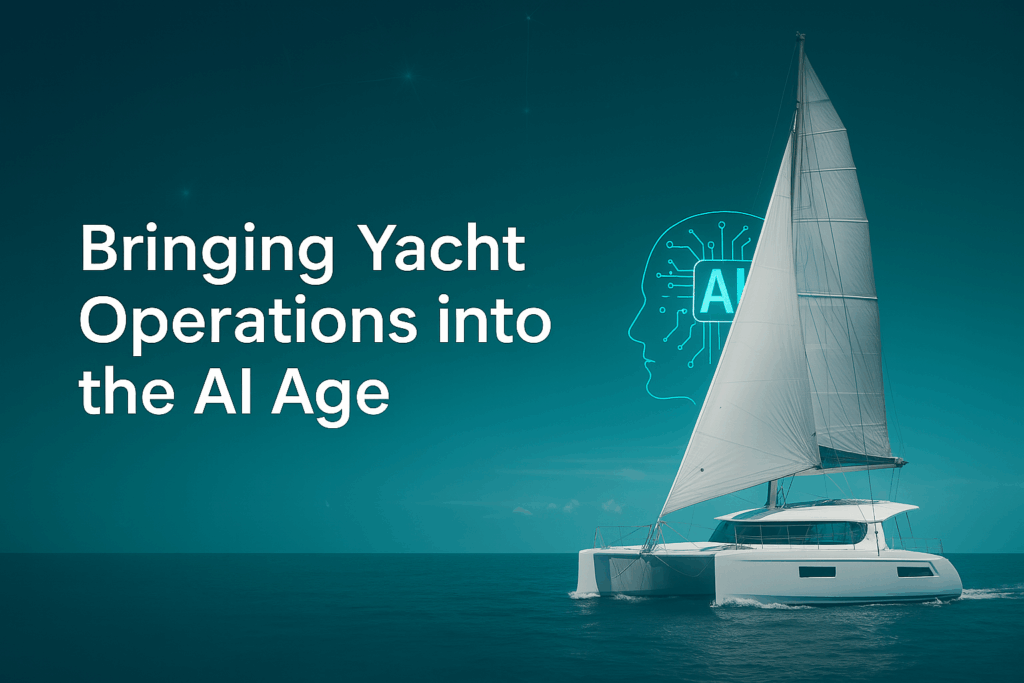
Marine Ledger - The future is here now!
In a world where technology is reshaping every corner of life, the yachting industry finds itself slowly catching up. For years, much of yacht management has remained manual, scattered across paperwork, disconnected spreadsheets, and apps that work only when you're tied to the dock with full internet access. It's interesting to observe how other sectors are rapidly adopting smart, integrated solutions that not only operate online but also anticipate offline necessities, legal accountability, and AI-powered efficiency. Meanwhile, many yachts at sea still rely on fragmented tools that can barely offer reliable logging when connection is lost.
Maritime professionals know the reality: when you're offshore, connectivity is never guaranteed. Systems that require a constant signal are simply not viable in this environment. The world is moving toward seamless, always-on data, but yachts must be equipped for the opposite—functionality even when the signal disappears. This is not a luxury; it's a necessity. As digital transformation pushes into the marine world, the need for systems that genuinely support offline operation becomes undeniable. In other industries, the offline-first approach is already gaining traction, especially in fields where safety and proof of action are critical.
When we look at the broader technological revolution, it’s impossible not to mention the giants shaping the future of AI. Elon Musk, through projects like Grok by xAI, is pushing for conversational AI systems capable of processing complex, real-time scenarios. OpenAI, the driving force behind ChatGPT, is rapidly expanding how artificial intelligence integrates into both business and personal life. Google DeepMind is continuously redefining machine learning capabilities, while Microsoft is embedding AI across its ecosystem, from Azure to Office. Amazon is applying AI to logistics, voice assistants, and cloud services at scale. Meta (led by Mark Zuckerberg) is developing open-source AI models and shaping social interactions through machine learning, and Jeff Bezos has invested heavily in AI through Amazon Web Services and robotics.
The momentum is undeniable. The marine world, although traditionally slower in digital adoption, is beginning to feel the pull of these innovations. However, considering the integration of AI into sailing comes with unique complexities. Unlike controlled logistics environments, sailing introduces unpredictable weather, human coordination, and decision-making that historically seemed unimaginable to automate. These are not simple problems. While AI-managed container ships are already crossing oceans today, fully autonomous sailing vessels are still on the horizon. The idea was once unthinkable—but now, as AI navigates cargo routes and even assists in remote medical diagnostics, it becomes fair to ask: how far are we from a world where AI can manage complex sailing missions with minimal human input? The answer is that the path is opening, but sailing remains one of the most intricate operational environments to automate. Still, the conversation has begun, and with every new advancement, the gap narrows.
The evolution of the sail itself is contributing to this shift. Modern yacht designs are beginning to adopt self-adjusting wings, like those developed by Saildrone, which can automatically optimize sail trim without human input. Fully electric and off-the-grid catamarans, like the ZEN50 by Zen Yachts, now feature automated wingsails and energy systems that allow long-range cruising with minimal intervention. Solar-powered yachts like the SILENT-60 by Silent Yachts push this even further, using kite wings and solar arrays to operate entirely off-grid. These advances show that what was once unimaginable is already underway. Conversations are shifting toward how AI could support safety, predictive maintenance, and smarter route planning in offshore environments.
But the leap to AI doesn't happen overnight. It starts with building systems that are smart, connected, and legally sound today—systems like Marine Ledger. While the app doesn't claim to be fully AI-powered yet, it is already designed to support the way captains, crews, and owners work in the real world, particularly when they're hundreds of miles from shore.
Marine Ledger isn’t just a logbook; it's a smart, offline-capable yacht operations platform that brings voyage logging, expense tracking, crew management, and legally formatted reporting into one unified tool. It’s built with the resilience that offshore operations demand and is ready to grow into a future where AI-supported decision-making could become a natural extension.
The app is built to work whether you're in port or crossing oceans, syncing when you can, safeguarding data when you can't. And while many digital products are racing toward automation and AI, the marine world still craves tools that can be trusted in the harshest conditions. Marine Ledger bridges this gap by offering a platform where offline functionality isn't an afterthought—it's the foundation.
The project is currently in development and seeking investment partners who see the potential in this evolving space. For now, Marine Ledger is fully committed to delivering a solid, reliable yacht operations app with the capacity to evolve alongside the wider digital landscape.
To explore more about Marine Ledger, visit the Home Page and the Investors Page.
This is not a distant future; it's a natural next step. And for those with vision, it's an opportunity ready to set sail.
